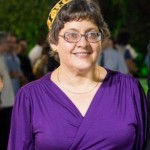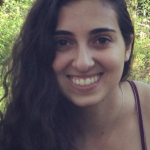My reading
Haftarah Parashat Va-etchanan
Isaiah 40: 1-26
40:1 נַחֲמ֥וּ נַחֲמ֖וּ עַמִּ֑י יֹאמַ֖ר אֱלֹהֵיכֶֽם׃
40:2 דַּבְּר֞וּ עַל־לֵ֤ב יְרֽוּשָׁלִַ֙ם֙ וְקִרְא֣וּ אֵלֶ֔יהָ כִּ֤י מָֽלְאָה֙ צְבָאָ֔הּ כִּ֥י נִרְצָ֖ה עֲוֹנָ֑הּ כִּ֤י לָקְחָה֙ מִיַּ֣ד יְהוָ֔ה כִּפְלַ֖יִם בְּכָל־חַטֹּאתֶֽיהָ׃
40:3 ק֣וֹל קוֹרֵ֔א בַּמִּדְבָּ֕ר פַּנּ֖וּ דֶּ֣רֶךְ יְהוָ֑ה יַשְּׁרוּ֙ בָּעֲרָבָ֔ה מְסִלָּ֖ה לֵאלֹהֵֽינוּ׃
40:4 כָּל־גֶּיא֙ יִנָּשֵׂ֔א וְכָל־הַ֥ר וְגִבְעָ֖ה יִשְׁפָּ֑לוּ וְהָיָ֤ה הֶֽעָקֹב֙ לְמִישׁ֔וֹר וְהָרְכָסִ֖ים לְבִקְעָֽה׃
40:5 וְנִגְלָ֖ה כְּב֣וֹד יְהוָ֑ה וְרָא֤וּ כָל־בָּשָׂר֙ יַחְדָּ֔ו כִּ֛י פִּ֥י יְהוָ֖ה דִּבֵּֽר׃
40:6 ק֚וֹל אֹמֵ֣ר קְרָ֔א וְאָמַ֖ר מָ֣ה אֶקְרָ֑א כָּל־הַבָּשָׂ֣ר חָצִ֔יר וְכָל־חַסְדּ֖וֹ כְּצִ֥יץ הַשָּׂדֶֽה׃
40:7 יָבֵ֤שׁ חָצִיר֙ נָ֣בֵֽל צִ֔יץ כִּ֛י ר֥וּחַ יְהוָ֖ה נָ֣שְׁבָה בּ֑וֹ אָכֵ֥ן חָצִ֖יר הָעָֽם׃
40:8 יָבֵ֥שׁ חָצִ֖יר נָ֣בֵֽל צִ֑יץ וּדְבַר־אֱלֹהֵ֖ינוּ יָק֥וּם לְעוֹלָֽם׃
40:9 עַ֣ל הַר־גָּבֹ֤הַ עֲלִי־לָךְ֙ מְבַשֶּׂ֣רֶת צִיּ֔וֹן הָרִ֤ימִי בַכֹּ֙חַ֙ קוֹלֵ֔ךְ מְבַשֶּׂ֖רֶת יְרוּשָׁלִָ֑ם הָרִ֙ימִי֙ אַל־תִּירָ֔אִי אִמְרִי֙ לְעָרֵ֣י יְהוּדָ֔ה הִנֵּ֖ה אֱלֹהֵיכֶֽם׃
40:10 הִנֵּ֨ה אֲדֹנָ֤י יְהוִה֙ בְּחָזָ֣ק יָב֔וֹא וּזְרֹע֖וֹ מֹ֣שְׁלָה ל֑וֹ הִנֵּ֤ה שְׂכָרוֹ֙ אִתּ֔וֹ וּפְעֻלָּת֖וֹ לְפָנָֽיו׃
40:11 כְּרֹעֶה֙ עֶדְר֣וֹ יִרְעֶ֔ה בִּזְרֹעוֹ֙ יְקַבֵּ֣ץ טְלָאִ֔ים וּבְחֵיק֖וֹ יִשָּׂ֑א עָל֖וֹת יְנַהֵֽל׃
40:12 מִֽי־מָדַ֨ד בְּשָׁעֳל֜וֹ מַ֗יִם וְשָׁמַ֙יִם֙ בַּזֶּ֣רֶת תִּכֵּ֔ן וְכָ֥ל בַּשָּׁלִ֖שׁ עֲפַ֣ר הָאָ֑רֶץ וְשָׁקַ֤ל בַּפֶּ֙לֶס֙ הָרִ֔ים וּגְבָע֖וֹת בְּמֹאזְנָֽיִם׃
40:13 מִֽי־תִכֵּ֥ן אֶת־ר֖וּחַ יְהוָ֑ה וְאִ֥ישׁ עֲצָת֖וֹ יוֹדִיעֶֽנּוּ׃
40:14 אֶת־מִ֤י נוֹעָץ֙ וַיְבִינֵ֔הוּ וַֽיְלַמְּדֵ֖הוּ בְּאֹ֣רַח מִשְׁפָּ֑ט וַיְלַמְּדֵ֣הוּ דַ֔עַת וְדֶ֥רֶךְ תְּבוּנ֖וֹת יוֹדִיעֶֽנּוּ׃
40:15 הֵ֤ן גּוֹיִם֙ כְּמַ֣ר מִדְּלִ֔י וּכְשַׁ֥חַק מֹאזְנַ֖יִם נֶחְשָׁ֑בוּ הֵ֥ן אִיִּ֖ים כַּדַּ֥ק יִטּֽוֹל׃
40:16 וּלְבָנ֕וֹן אֵ֥ין דֵּ֖י בָּעֵ֑ר וְחַיָּת֔וֹ אֵ֥ין דֵּ֖י עוֹלָֽה׃
40:17 כָּל־הַגּוֹיִ֖ם כְּאַ֣יִן נֶגְדּ֑וֹ מֵאֶ֥פֶס וָתֹ֖הוּ נֶחְשְׁבוּ־לֽוֹ׃
40:18 וְאֶל־מִ֖י תְּדַמְּי֣וּן אֵ֑ל וּמַה־דְּמ֖וּת תַּ֥עַרְכוּ לֽוֹ׃
40:19 הַפֶּ֙סֶל֙ נָסַ֣ךְ חָרָ֔שׁ וְצֹרֵ֖ף בַּזָּהָ֣ב יְרַקְּעֶ֑נּוּ וּרְתֻק֥וֹת כֶּ֖סֶף צוֹרֵֽף׃
40:20 הַֽמְסֻכָּ֣ן תְּרוּמָ֔ה עֵ֥ץ לֹֽא־יִרְקַ֖ב יִבְחָ֑ר חָרָ֤שׁ חָכָם֙ יְבַקֶּשׁ־ל֔וֹ לְהָכִ֥ין פֶּ֖סֶל לֹ֥א יִמּֽוֹט׃
40:21 הֲל֤וֹא תֵֽדְעוּ֙ הֲל֣וֹא תִשְׁמָ֔עוּ הֲל֛וֹא הֻגַּ֥ד מֵרֹ֖אשׁ לָכֶ֑ם הֲלוֹא֙ הֲבִ֣ינֹתֶ֔ם מוֹסְד֖וֹת הָאָֽרֶץ׃
40:22 הַיֹּשֵׁב֙ עַל־ח֣וּג הָאָ֔רֶץ וְיֹשְׁבֶ֖יהָ כַּחֲגָבִ֑ים הַנּוֹטֶ֤ה כַדֹּק֙ שָׁמַ֔יִם וַיִּמְתָּחֵ֥ם כָּאֹ֖הֶל לָשָֽׁבֶת׃
40:23 הַנּוֹתֵ֥ן רוֹזְנִ֖ים לְאָ֑יִן שֹׁ֥פְטֵי אֶ֖רֶץ כַּתֹּ֥הוּ עָשָֽׂה׃
40:24 אַ֣ף בַּל־נִטָּ֗עוּ אַ֚ף בַּל־זֹרָ֔עוּ אַ֛ף בַּל־שֹׁרֵ֥שׁ בָּאָ֖רֶץ גִּזְעָ֑ם וְגַם־נָשַׁ֤ף בָּהֶם֙ וַיִּבָ֔שׁוּ וּסְעָרָ֖ה כַּקַּ֥שׁ תִּשָּׂאֵֽם׃
40:25 וְאֶל־מִ֥י תְדַמְּי֖וּנִי וְאֶשְׁוֶ֑ה יֹאמַ֖ר קָדֽוֹשׁ׃
40:26 שְׂאוּ־מָר֨וֹם עֵינֵיכֶ֤ם וּרְאוּ֙ מִי־בָרָ֣א אֵ֔לֶּה הַמּוֹצִ֥יא בְמִסְפָּ֖ר צְבָאָ֑ם לְכֻלָּם֙ בְּשֵׁ֣ם יִקְרָ֔א מֵרֹ֤ב אוֹנִים֙ וְאַמִּ֣יץ כֹּ֔חַ אִ֖ישׁ לֹ֥א נֶעְדָּֽר׃










